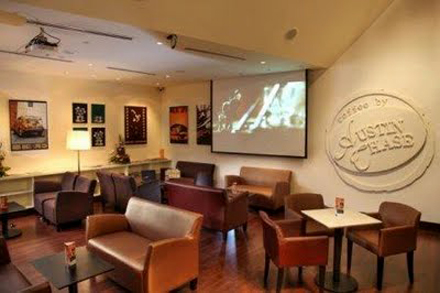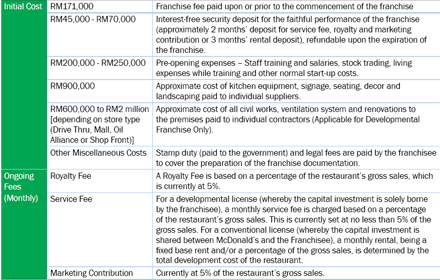Businesses expand effectively and quickly around the world through the franchising system. In the United States, there are believed to be more than 750,000 franchise businesses, with the franchising industry employing over 18 million people. Other intriguing facts and statistics related to the franchise industry in the U.S., according to the International Franchise Association (IFA) are:
 • 1 out of every 12 businesses is a franchised business
• 1 out of every 12 businesses is a franchised business
• A new franchised business is opened every 8 minutes of every business day
• In 2004, it is estimated that franchise businesses were responsible for over USD1.5 trillion in economic output
• Almost 4% of all small businesses in the U.S. are franchises
• The top franchise industry is the fast food franchise
• The top franchise company is none other than McDonald’s
On the Malaysian front, according to our Domestic Trade, Co-operatives and Consumerism Minister, Datuk Seri Ismail Sabri Yaakob, there are currently a total of 454 franchise business in our country. Although the franchise industry is relatively new in the country, it has shown positive development in the past two decades. Datuk Seri Ismail Sabri further voiced that by 2012, around 5,000 entrepreneurs are expected to become franchisees.
With the rise of Malaysian entrepreneurs venturing into the franchise industry, it is important to ensure that any venture is a calculated risk. This brings us back to the issue at hand: what are the Intellectual Property (IP) and financial considerations that a master franchisee should look into before embarking to invest in a foreign franchise?
When this question was put to the master franchisee of the “AUSTIN CHASE” coffee chain in Malaysia and Singapore, Thesan Salva, CEO of Chase Coffee Holdings (M) Sdn. Bhd., his response was simple and direct to the point:
“Is the brand in the franchise well-known in the country or territory of the franchisee?”
“If not, does the franchise have a unique selling point that will generate traffic to its outlet?”
In his case, Thesan not only had a well-known brand as “AUSTIN CHASE” has been present in Malaysia since 1991, but he also had a unique selling point – all the beans at Austin Chase were hand roasted by the principal/franchisor in Seattle.
Thesan’s answer was interesting in that he had considered the IP rights attached to the franchise before considering other implications. If the brand (trademark) was well-known in the territory, then the franchisee need not exert too much effort in generating sales and introducing the brand to the masses. The public will more readily trust and accept the brand as they will be assured of the quality of products or services that the brand stands for, and this in turn encourages them to frequent the franchisee’s business. Time and money can then be invested by the franchisee in other elements in the business, perhaps the construction cost, cost of the goods, staff salary etc.
On the other hand, if the brand was not known, the effort, time and money invested by the franchisee in taking on the franchise is a risky affair. The franchisee does not know how the market will respond to the franchise, whether it will merely be another average brand in the market or whether it will be an astoundingly profitable success. A franchise with a unique selling point will reduce the risk involved in introducing a non well-known brand into the market.
Now, whether the brand of the franchise is well-known or whether there is a unique selling point both issues are related to IP rights. The brand is the trademark of the franchise and the unique selling points could be various elements within the business that are uncommon in the industry. The unique elements and the trademark of the franchise are only exclusive to the franchisor and franchisee if they are protected as IP rights in territories where the business is carried out.

In the food industry (seemingly the most popular franchise worldwide), for example, the following elements can be protected by the franchisor:
• Name of Restaurant as a Trademark
• Staff uniform as a Design
• Menu Card and Menu Items under Copyright and Trademark (if the menu items are given a unique name)
• Recipe as Trade Secret
• Shape of food items as a Design
• Patterns on plates and design on cutleries as a Design
• Cooking apparatus or machinery as a Product Patent or Process Patent
• Interior design or layouts of restaurants as a Design
It can be said that the more IP rights the franchisor has protected (registered), the lower the risk of the franchise being copied and the more exclusive the franchise will be.
Different franchises will of course have different IP rights. Some may have new products or processes which can be patented (and should have been) by the principal/franchisor. Some may have a trademark and copyright for their published material or recordings, such as franchises involved in the development of human resources (e.g., Franklin Covey, Anthony Robbins). The IP rights in a franchise will usually be owned by the Principal, and the master franchisee will merely own the licenses to use the IP rights in the area and time period agreed on by both parties. This can be a major drawback to franchisees as once the franchise agreement terminates, the franchisee will not have any rights to use the IP rights in the business regardless of the monies expended to build the business in the specific region.
However, if any new IP is created during the course of the franchise period by the franchisee, the rights should be jointly owned by both parties. Let’s take the example of a franchise for a hair salon. If a new haircut is created by the franchisee and a unique name (trademark) is given to that cut/style, the franchisee should have rights, or at least partial rights, to the new trademark. However, whether or not the franchisee has rights depends on the original franchise agreement entered into by both parties at the start of the relationship.
With franchises, if a third party infringes the IP rights in the franchise (copies or reproduces the rights without any consent from the Principal or franchisee), the Principal will need to be informed of the infringement by the franchisee as soon as possible. The Principal will then initiate the litigation in Court against the infringer. In some cases, the franchisee will also be a party to the legal suit and will have a share of the damages incurred as a result of the infringement.

Master franchisees, once they have assured that the IP rights in the franchise are properly taken care of, have to then consider the finances needed to fund the purchase of the foreign franchise. The fees that may arise when purchasing a franchise are as listed below:
1. Upfront franchise fee
The initial franchise fee varies depending on various factors, such as – Is the principal/franchisor an established franchisor? What is the track record of the franchises held by the other franchisees? Is the brand of the franchise well-known? Master franchise fees will definitely be much costlier than individual franchises as the Principal, by awarding a master franchise, has given exclusive rights to one party to expand the franchise business in a specific region. Until the agreement is terminated, the Principal can no longer offer franchises to any third party in that region.
2. Periodic payments
In exchange for the use of the principal’s brand, a royalty fee will be paid either as a lump sum or based on sales or both, where a minimum lump sum fee is paid, followed by a certain percentage on top of the turnover earned by the business.
3. Cost of premises
Generally, franchisees will receive guidance on how to choose a location that is right for the type of business carried out and the franchisor will help with providing advice on the construction of the premise for the franchise. However, the cost to rent, construct or renovate the premises will be borne by the franchisee.
4. Other costs
Cost to equip an outlet, to purchase initial inventory, operating license, insurance, furniture and anything else required to make the outlet operational will be additional cost to the franchisee.
5. Advertising and Promotion (A&P) cost
Most franchisors require a percentage (usually 2%) of the turnover from each outlet to be paid to the franchisor as advertising and promotion fees. This is regardless of whether the advertising is targeted to the franchisee’s individual outlet. This payment may be used by the franchisor in their annual international A&P budget.
6. Training
Payment may be required for the regular training of managers and staff in the franchisee’s business and for materials used for the training. Cost may include fee to transport the principal to the country from wherever they reside, accommodation and meals.
Using McDonald’s as a case study, entrepreneurs who seek to be master franchisees can get an idea of the investments needed to obtain a franchise for a famous brand. On their website, www.mcdonalds.com.my, McDonald’s states that the cost for starting an entirely new McDonald’s restaurant in Malaysia can be anything between RM1.5 million to RM3.5million, due to factors such as the restaurant size and type, its location, style of décor and landscaping.
Of course, not all franchises are as costly as the McDonald’s franchise and the initial investment differs depending on the type of the business and the value of the brand in the franchise. Extensive research should be carried out before a foreign franchise is purchased and if the Principal has franchisees in other regions, a trip to the other franchisees’ outlets would be useful. Questions and doubts can be raised with the other franchisees that will be able to give you a rough idea of the challenges involved in the carrying out the franchise and the genuineness of the Principal, with whom you will be dealing throughout the business relationship.
The break up of the afore-mentioned cost is shown below in the form of “Initial Cost” and “Ongoing Monthly Payments” that the franchisee has to pay to McDonald’s:
(Source: www.mcdonalds.com.my at 21.06.2010)
A franchisee is always aware of the possibility that the business relationship may come to an end eventually. It is therefore important for master franchisees to foresee this reality and to ensure that their rights are taken care of in the franchising agreement. Termination may arise due to a breach of the agreement by the Principal or by the franchisee. Usually when there is a breach, both parties will allow the other party to rectify the breach before the agreement is terminated. It is when the matter is not remediable or when both parties wish to part due to other reasons (i.e. franchisee wishes to retire or no longer has interest in the business, etc) that the termination will be enforced. When this occurs, the Principal may seek to appoint a replacement franchisee whereas the franchisee will try to recover as much capital as he has invested into the business. In most terminations, the Principal will try to maintain the business, goodwill and reputation that the franchisee has built up and also protect the trade secrets, methods and know-how of conducting the franchise. The Principal will usually be given the right to purchase the equipment, inventory, furniture and so forth in the franchise from the franchisee at a reasonable price.
The Principal’s main fear would be that the franchisee, now armed with the trade secrets, methods and know-how gained from carrying out the franchise, will become his competitor in the same industry. To avoid this, the Principal will try to include a restriction in the franchise agreement under the termination clauses. However, the franchisor will not be able to prevent the franchisee from carrying out another similar business in the same industry altogether but can restrict the franchisee in regard to the area and period of time, as long as the restrictions are reasonable.
Although the termination of franchises may seem painful or harsh to certain parties, especially the franchisee who had invested a considerable amount of capital into the franchise, in most circumstances, terminations – even if they are caused by a breach – can be settled amicably between both parties without having to resort to litigation. Again, the relationship between the franchisor and franchisee is of utmost importance as the more genuinely eager each party is to see the other benefit from the franchising relationship, the higher the chances of the franchise being one of success and few (if any) disputes.

Geetha K. is Director of Trademarks and Industrial Designs Division at KASS International Sdn Bhd, a reputable intellectual property firm in Malaysia. For more information, contact +603-2284 7872 or visit www.kass.com.my






